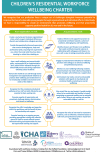Reflections from the forgotten frontline: 'The reality for children and staff in residential care' during COVID-19
- PMID: 33955627
- PMCID: PMC8239614
- DOI: 10.1111/hsc.13394
Reflections from the forgotten frontline: 'The reality for children and staff in residential care' during COVID-19
Abstract
Currently, 78,150 children are in care in England, with 11% of the most vulnerable living in 2,460 residential homes due to multitype traumas. These children require safe and secure trauma-informed therapeutic care. However, the children's residential care workforce delivering this vital care is an unrepresented, under-researched and largely unsupported professional group. The workforce undertakes physically and emotionally challenging work in difficult conditions, exacerbated by the COVID-19 pandemic. Practitioner wellbeing is directly associated with outcomes for children. Therefore, we sought to understand how experiences within the workforce could improve overall working conditions, and thus outcomes for staff and children. Thirty participants took part in a survey, providing feedback on their experiences and the situations they faced during the English lockdown April-June 2020. Two participants also opted to take part in a teleconference interview, rather than survey, although were asked the same questions. Data were analysed through thematic analysis. A stakeholder advisory board supported the project, including frontline staff, care leavers, service managers and policy researchers. The advisory board assisted in reflecting on the data from the survey and interviews to generate a complete analysis. Overall, staff require facilitated safe spaces for peer-support, reflective and emotionally supportive supervision. An organisational awareness that staff wellbeing is intrinsically connected to the wellbeing and therapeutic outcomes of the children they care for is essential. Further, staff require a sense of belongingness to feel safe and competent in their role due to a lack of external recognition and professional representation or validation. Based on the findings of the study and an iterative process with the stakeholder advisory board, we created a Wellbeing Charter for adoption within organisations to promote and protect the wellbeing of this vital workforce. The COVID-19 pandemic has exposed professional, financial and environmental inequalities that affect these frontline workers. Implementing organisational, statutory and policy-driven initiatives to prioritise their wellbeing are essential for the vulnerable children they care for.
Keywords: qualitative; residential children's homes; thematic; workforce wellbeing.
© 2021 The Authors. Health and Social Care in the Community published by John Wiley & Sons Ltd.
Conflict of interest statement
No conflict of interest to declare.
Figures
References
-
- Anwar‐McHenry, J. , & Donovan, R. (2013). The development of the Perth Charter for the Promotion of Mental Health and Wellbeing. International Journal of Mental Health Promotion, 15(1), 58–64. 10.1080/14623730.2013.810402 - DOI
-
- Bazalgette, L. , Rahilly, T. , & Trevelyan, G. (2015). Achieving emotional wellbeing for looked after children: A whole system approach.
-
- Bernard, B. (2004). Resiliency: What we have learned. WestEd; New title edition (1 Jan. 2004). ISBN‐10: 0914409182
-
- Braun, V. , & Clarke, V. (2020). One size fits all? What counts as quality practice in (reflexive) thematic analysis? Qualitative Research in Psychology, 1–25, 10.1080/14780887.2020.1769238 - DOI
MeSH terms
Grants and funding
LinkOut - more resources
Full Text Sources
Other Literature Sources
Medical
Miscellaneous



